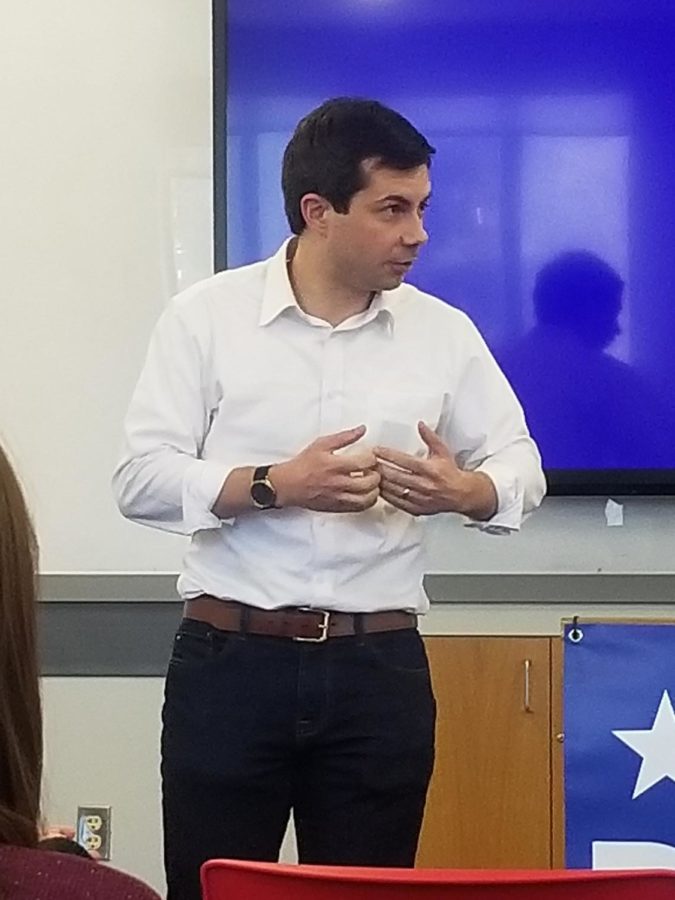‘Mayor Pete’ talks 2020 with Ames voters
Pete Buttigieg, also known as “Mayor Pete,” is a Democratic presidential hopeful and mayor of South Bend, Indiana.
February 8, 2019
Never in American history has a person been elected to the presidency directly from a mayoral position, but that’s exactly what Pete Buttigieg intends to do.
The South Bend, Indiana, mayor joined the parade of Democrats touring Iowa this month when he stopped at Pearson Hall Friday for a meet and greet with nearly 50 students, faculty and community members.
Buttigieg, 37, is an Afghanistan War veteran and Rhodes Scholar and hopes to become America’s youngest and first openly-gay president. During his visit, he discussed his plans for navigating partisan politics, strengthening foreign policy and combating climate change.
While some see his path to the White House as unconventional, Buttigieg said he believes coming straight from a Midwestern city government is an asset to his campaign because he wouldn’t reflect the dynamic of partisan fighting in Congress.
“Cities don’t shut down their governments over policy disagreements,” Buttigieg said.
Buttigieg told voters that working as a part of the city government in a largely Republican area helped him develop into a more “pragmatic” and “results-oriented” politician.
“Mayors have the muscle memory to do it,” Buttigieg said. “You can’t afford to write out part of your community.”
Cody Woodruff, speaker of the senate for Student Government and a senior in political science, asked Buttigieg about how the country can heal from political division, an issue which he said at time has affected Iowa State students.
“Should we forgive the president and his party for the pain they’ve inflicted on the American people and can you do that?” Woodruff asked.
Buttigieg called the question “very healthy and very serious,” and said it is important to bring people from all backgrounds together while maintaining a zero-tolerance policy for racism and xenophobia, which he described as “very dark impulses that were harvested by the rhetoric of [Trump’s] campaign.”
“Taking people seriously as people, which I think is what your question is getting at … I think that idea of reconciliation is incredibly important,” Buttigieg said.
After the event, Woodruff said he wasn’t yet sure how he felt about the answer, but he liked that Buttigieg “took it on.”
“What I really liked was that he made it clear whether he gets elected or not, there’s no one person who’s a figure … that can give that forgiveness, so I think that’s a national thing that we in the Democratic party need to talk about and we in the nation need to talk about, that forgiveness of one another,” Woodruff said.
Throughout the event, Buttigieg continually spoke about the idea of uniting across the aisle without moving ideologically further right, which has historically been viewed as the best way to combat partisanship.
One example he cited was the Affordable Care Act, which he said has been viewed as a far-left policy, despite being a “fundamentally right proposal.” He described health care policies as a spectrum, with “Medicare for All,” which he supports, being further left ideologically.
College Democrats President Taylor Blair, whose organization co-hosted the event with the Society for the Advancement of Gender Equity (SAGE) and Pride Alliance, said he was glad Buttigieg made that analysis of health care policies, which is one of the top priorities for Blair as a voter.
“I really like that he talked about [the Affordable Care Act] because people pretend that it’s this socialist, far left thing, but it’s what Mitt Romney did in Massachusetts,” Blair said. “I like the way he framed that and talked about that and solutions again, like ‘what is the solution we’re looking for? How do we cover the amount of people we need? How do we make sure people don’t die?’”
Blair also listed climate change as one of his top priorities, as did Jacob Yarian, a first-year graduate student in animal science. During the event, Yarian asked Buttigieg about his plans to fight climate change.
Buttigieg said he supports the Green New Deal, an environmental economic policy which Rep. Alexandria Ocasio-Cortez, D-N.Y., and Sen. Ed Markey, D-Mass., officially introduced Thursday, but said he thinks “we need to put meat on the bones” of the policy.
Buttigieg went on to describe climate change as a national emergency and referenced both a “1,000 year flood” and a “500 year flood” that have taken place in his city since he assumed office in 2012.
Yarian said he was pleased with how important climate change appears to be to Buttigieg and said Buttigieg is “definitely a top runner” for him.
Yarian also asked Buttigieg about his plan to repair relationships with America’s allies after President Donald Trump’s “America first” policies.
Buttigieg spoke about his experience in the Navy, working with coalitions and stressing the importance of international partnerships.
“You can either resent the rest of the world or you can lead it,” Buttigieg said. “You can’t do both.”

















